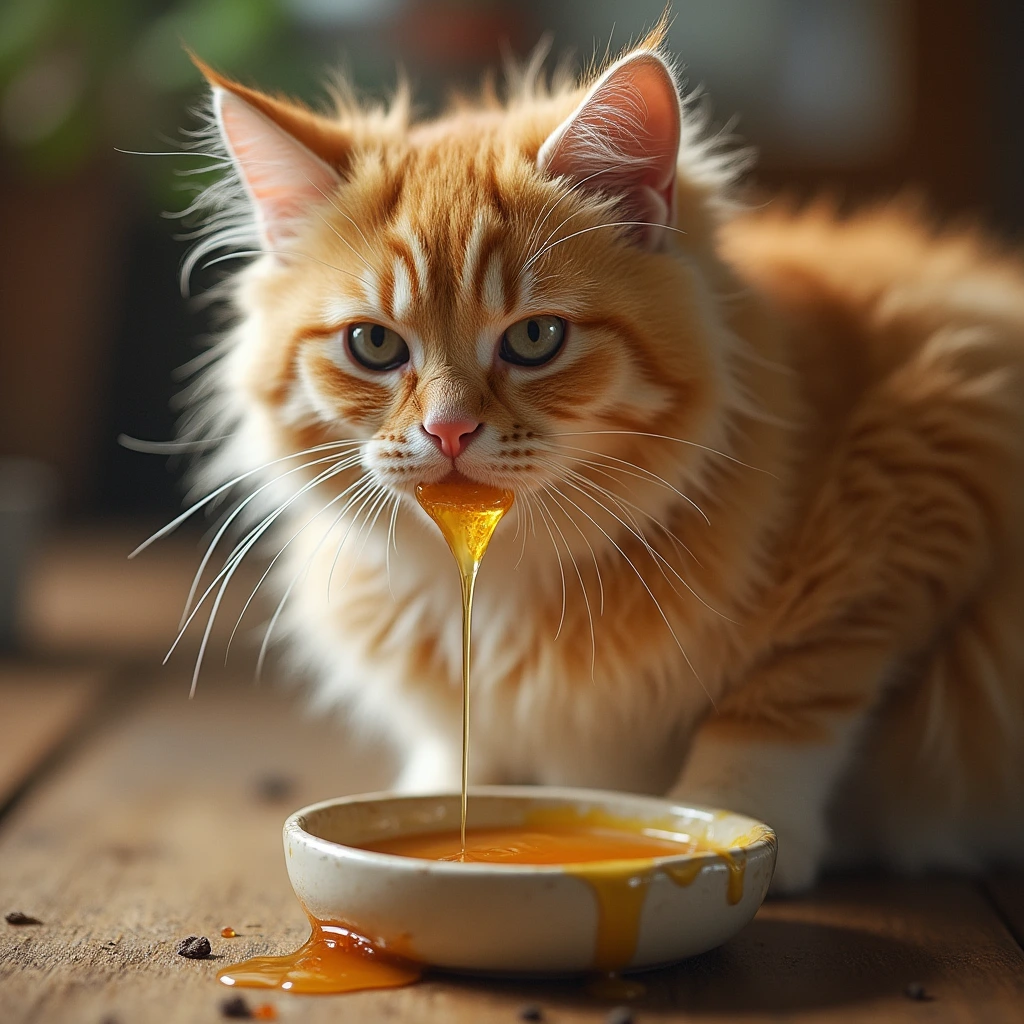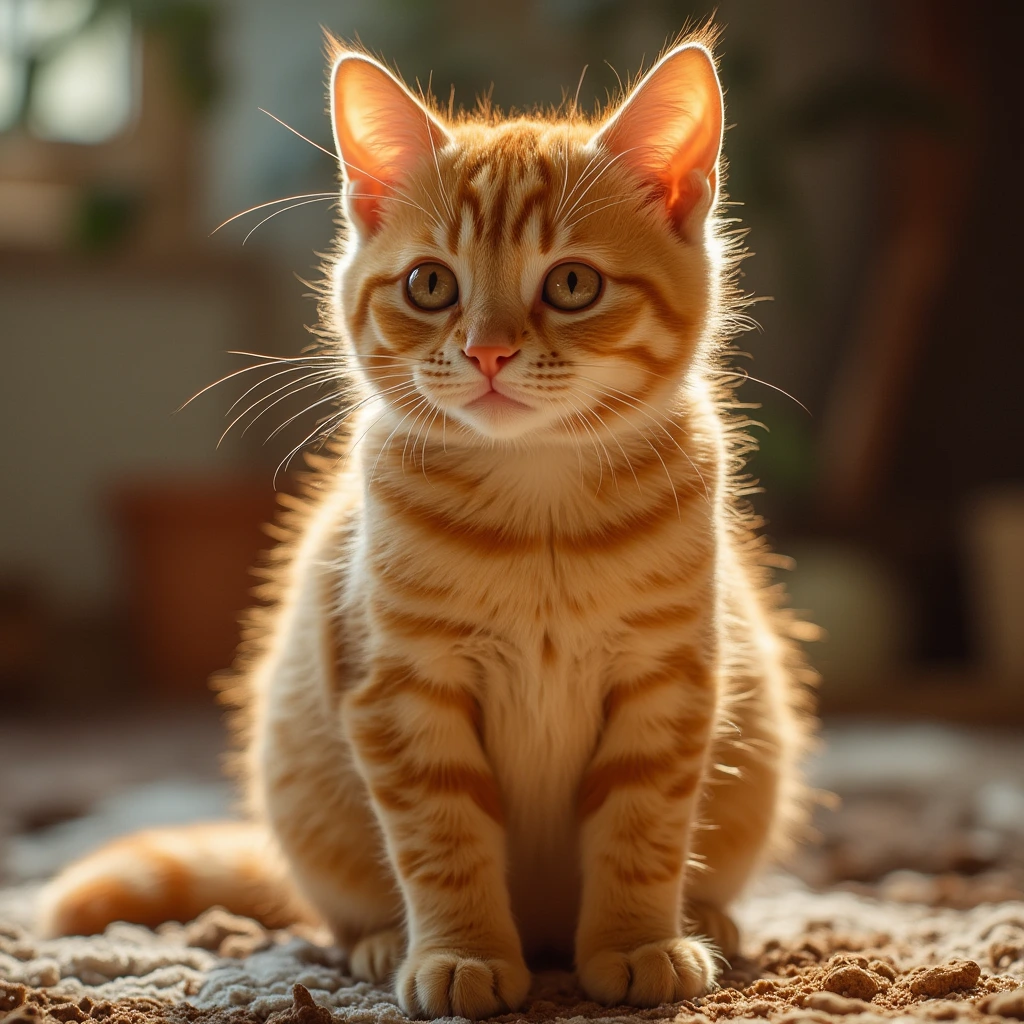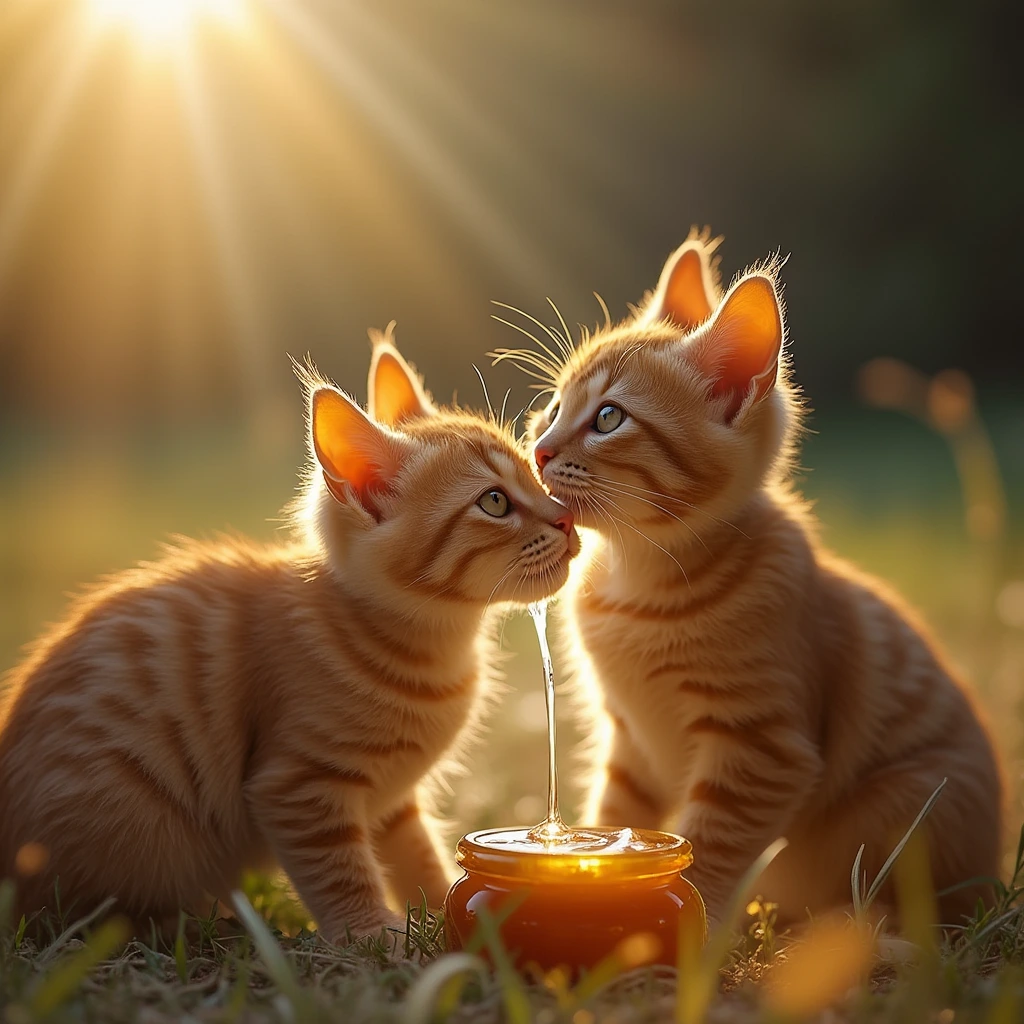is honey good for cats – when it comes to your cat’s health and well-being, every pet owner wants the best. If you’ve ever wondered about whether certain foods or remedies can enhance your furry friend’s life, you’re not alone. Honey, long celebrated for its natural benefits to humans, raises curiosity as a possible supplement for pets, too. But when it comes to giving honey to cats, is it a good choice or simply a sweet indulgence with hidden risks?
This comprehensive guide dives into the effects of honey on cats, weighing both the potential benefits and risks, so you can make an informed decision. You’ll find clear answers, expert insights, and a breakdown of safe practices if you’re considering honey as an option.
Table of Contents
Understanding Honey’s Composition- is honey good for cats

Honey has a remarkable nutritional profile that benefits humans in many ways. It’s packed with vitamins like B6, thiamine, niacin, and minerals such as calcium, iron, magnesium, and potassium. Additionally, honey contains amino acids and antioxidants, making it a popular choice for health-conscious consumers. However, while honey is beneficial to humans, cats have very different nutritional needs and digestive abilities.
Key Points:
- Vitamins and Minerals: Honey provides a range of vitamins and minerals. However, cats don’t require these from external sources due to the balanced nutrition found in quality cat food.
- Antioxidants: Known to support immune health in humans, but their effects on cats are limited and not well-studied.
Is Honey Safe for Cats? / is honey good for cats
The simple answer is yes, in small amounts, but with several important caveats. Honey isn’t toxic to cats, but it isn’t something they need in their diet. Cats are obligate carnivores, meaning they thrive on a diet rich in animal protein and minimal carbohydrates. Honey’s sugar content, while safe for humans, can disrupt your cat’s natural digestive processes, leading to an upset stomach or even more serious health concerns if consumed regularly.
Considerations:
- Cats’ Unique Digestive Needs: Cats lack the enzymes to digest sugars as effectively as humans. This can lead to an upset stomach and potentially more long-term health concerns.
- Potential Side Effects: Ingesting honey may cause vomiting, diarrhea, or discomfort due to the high sugar concentration.
Expert Insight: Many veterinarians advise against giving cats honey, as the cons generally outweigh any benefits.
Potential Benefits of Honey for Cats/ is honey good for cats

While honey isn’t necessary or ideal for a cat’s diet, there may be limited circumstances where honey could offer mild benefits, particularly when applied externally or in very tiny amounts as a last-resort remedy. Always consult with your vet before trying any of these methods.
Antimicrobial and Anti-inflammatory Properties- is honey good for cats
Certain types of honey, such as Manuka honey, are praised for their antimicrobial effects. When applied topically, Manuka honey may help with minor wounds, burns, or skin irritations in cats. However, it’s crucial to avoid direct ingestion and keep the affected area clean and monitored.
Important Notes:
- Manuka Honey: This specific type of honey has more potent healing properties, but it should only be applied topically and with veterinary approval.
- External Application Only: Never allow your cat to lick the honey off; the treatment area should be covered if possible.
Soothing Sore Throats and Coughs-is honey good for cats
If your cat has a mild sore throat or cough, a vet may suggest a tiny dab of honey. This is rare and usually only considered if other remedies are unavailable. Honey may coat the throat, temporarily relieving irritation.
Guidelines:
- Only a small amount (the size of a pinhead) should ever be administered to a cat, and only under vet guidance.
- Alternative remedies, such as pet-safe throat sprays, are generally better for soothing a cat’s throat without the risk of digestive upset.
Risks and Side Effects of Feeding Honey to Cats / is honey good for cats
Despite honey’s popularity in human diets, the risks for cats often outweigh the rewards. Due to the differences in digestive systems, honey may cause several side effects in cats that make it an unsuitable choice for regular feeding.
Digestive Issues
Cats’ bodies aren’t designed to process sugars, making honey hard to digest. Even a small amount of honey can disrupt the delicate balance in a cat’s digestive tract, leading to symptoms like diarrhea, bloating, or vomiting.
- Diarrhea and Vomiting: High sugar levels may cause these common issues.
- Bloating and Stomach Discomfort: If your cat consumes honey, monitor them closely for signs of digestive upset.
High Sugar Content
Regularly giving honey to your cat could lead to problems associated with sugar intake, such as weight gain, diabetes, and tooth decay. Cats rely on a protein-focused diet, and the added sugar content in honey does not align with their natural dietary needs.
- Risk of Obesity: Excessive sugar contributes to weight gain and potential obesity.
- Dental Health: Sugar sticks to teeth, increasing the risk of dental disease.
Potential Allergic Reactions
Though rare, cats can experience allergic reactions to honey. Symptoms could range from itching and swelling to more serious effects. If your cat has any known allergies, it’s best to avoid honey altogether.
When (and How) to Give Honey to Your Cat-is honey good for cats
Before ever considering honey as a supplement for your cat, always consult a veterinarian. If honey is recommended, it’s usually only in very small quantities and for specific purposes.
Only with Veterinary Approval
Your vet may advise using honey in an emergency situation, such as when other treatments are unavailable. Honey should never replace regular cat food or prescribed medicines, but rather be used as a temporary aid under guidance.
Suggested Dosage:
- No more than a drop or two at a time, administered carefully.
- Monitor for signs of digestive distress following administration.
Safe Ways to Offer Honey / is honey good for cats
In case honey is approved by your vet, the best approach is to apply it in very tiny amounts or use it externally for wound care. Do not add it directly to your cat’s food or allow them to consume it in large quantities.
Alternatives to Honey for Cat Health
If you’re looking for natural ways to support your cat’s health, there are better options than honey. These alternatives align more closely with feline dietary needs and offer health benefits without the risk of digestive issues.
Better Natural Options for Cats
- Cat-safe herbs like catnip or parsley, which can provide mild health benefits.
- Omega-3 supplements from fish oils can improve coat health and reduce inflammation without the added sugars.
Importance of a Balanced Diet
Quality cat food is designed to meet all of your cat’s nutritional needs, including protein, vitamins, and minerals. Avoiding unnecessary additions like honey is a good rule of thumb for a healthy, balanced feline diet.
Pros and Cons of Honey for Cats
| Pros | Cons |
|---|---|
| May help with wound care (topical) | High sugar content harmful for cats |
| Can soothe sore throats in rare cases | Can cause digestive issues (vomiting, diarrhea) |
| Contains vitamins and antioxidants | Risk of obesity, diabetes, and dental issues |
| May lead to allergic reactions |

FAQ Section
Can cats eat honey safely?
Honey is safe in extremely small amounts but isn’t recommended due to the potential for digestive upset and high sugar content.
What happens if a cat eats honey?
Most cats will be fine if they consume a small amount, but it can lead to stomach upset, vomiting, or diarrhea.
Why can’t cats digest honey like humans?
Cats are obligate carnivores and lack the enzymes to properly process sugars, which makes honey difficult to digest and potentially harmful.
Is honey good for cats with coughs?
In rare cases, honey might help soothe a mild cough, but only in small amounts and under veterinary guidance.
Conclusion
When it comes to honey, it’s important to remember that cats have very different dietary needs from humans. While honey isn’t toxic to cats, it’s generally best avoided due to the potential for digestive issues and other health risks. If you’re considering any dietary supplement or natural remedy, consult your veterinarian to make the best choice for your cat’s health.
For more cat care advice, health tips, and nutrition guidance, visit MeowRealm. If you found this guide helpful, share it with other cat lovers in your life!

